5 aug 2018
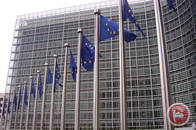
The European Union (EU) made a contribution amounting to €10 million and another €0.62 million from the Netherlands to the Palestinian Authority (PA) for the salaries and pensions of Palestinian civil servants in the occupied West Bank.
The EU and the Netherlands made such a contribution to the PA’s payment of nearly 55,000 Palestinian civil servants and pensioners.
EU Representative. Ralph Tarraf, said in a statement that "The civil servants play an important role in Palestinian life by making sure that the public policies and services are carried out. They ensure the functioning of the system, stability and security.”
Tarraf added “Civil servants and pensioners rely on their wages for their day-to-day life. Our contributions to civil servants salaries and pensions demonstrate once more the European Union's enduring support for Palestinian state-building efforts.
He confirmed that the EU along with its Member States remain committed to the Palestinian people.
EU contributions go towards the salaries of Palestinian civil servants and pensioners to help ensure that essential services, such as hospitals and schools, continue operating in the West Bank.
Since the launch of PEGASE, the financial mechanism to support the PA Reform and Development Plan and subsequent Palestinian national plans and agendas, over € 2.3 billion have been donated by the EU through the PEGASE programs.
In addition, the EU has provided assistance to the Palestinian people through UNRWA and several other international NGO’s, including humanitarian and food aid programs.
The EU and the Netherlands made such a contribution to the PA’s payment of nearly 55,000 Palestinian civil servants and pensioners.
EU Representative. Ralph Tarraf, said in a statement that "The civil servants play an important role in Palestinian life by making sure that the public policies and services are carried out. They ensure the functioning of the system, stability and security.”
Tarraf added “Civil servants and pensioners rely on their wages for their day-to-day life. Our contributions to civil servants salaries and pensions demonstrate once more the European Union's enduring support for Palestinian state-building efforts.
He confirmed that the EU along with its Member States remain committed to the Palestinian people.
EU contributions go towards the salaries of Palestinian civil servants and pensioners to help ensure that essential services, such as hospitals and schools, continue operating in the West Bank.
Since the launch of PEGASE, the financial mechanism to support the PA Reform and Development Plan and subsequent Palestinian national plans and agendas, over € 2.3 billion have been donated by the EU through the PEGASE programs.
In addition, the EU has provided assistance to the Palestinian people through UNRWA and several other international NGO’s, including humanitarian and food aid programs.
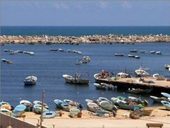
Israeli navy ships attacked, Sunday, several fishing boats in Palestinian territorial waters along the coastal line in northern Gaza.
The WAFA Palestinian News Agency said the navy fired many live rounds at the boats, and sprayed them with water cannons, forcing the fishermen back to shore.
Earlier Sunday, the navy fired many live rounds at Palestinian fishing boats in central Gaza, also forcing the fishermen to sail back to shore, in fear of further Israeli violations.
Last month, Israeli unilaterally decreased the fishing zone to the fishermen in Gaza from six to three nautical miles, also until further notice.
In late February of this year, the navy killed a Palestinian fisherman, identified as Ismael Saleh Abu Ryala, 18, from Shati’ refugee camp, west of Gaza city.
There are more than 4000 fishers and around 700 boats in the Gaza Strip providing livelihood to dozens of at least 70.000 Palestinians, while the Israeli military and navy keep attacking them, kidnapping them and confiscating their boats, in addition to the dozens of casualties, including fatalities, resulting from these violations.
It is worth mentioning that, under the Oslo Peace Agreement, signed between Israel and the Palestine Liberation Organization in 1993, the fishing zone was set at twenty nautical miles, where the Palestinians are supposed to be able to fish and sail, but Israel kept violating the agreement.
The WAFA Palestinian News Agency said the navy fired many live rounds at the boats, and sprayed them with water cannons, forcing the fishermen back to shore.
Earlier Sunday, the navy fired many live rounds at Palestinian fishing boats in central Gaza, also forcing the fishermen to sail back to shore, in fear of further Israeli violations.
Last month, Israeli unilaterally decreased the fishing zone to the fishermen in Gaza from six to three nautical miles, also until further notice.
In late February of this year, the navy killed a Palestinian fisherman, identified as Ismael Saleh Abu Ryala, 18, from Shati’ refugee camp, west of Gaza city.
There are more than 4000 fishers and around 700 boats in the Gaza Strip providing livelihood to dozens of at least 70.000 Palestinians, while the Israeli military and navy keep attacking them, kidnapping them and confiscating their boats, in addition to the dozens of casualties, including fatalities, resulting from these violations.
It is worth mentioning that, under the Oslo Peace Agreement, signed between Israel and the Palestine Liberation Organization in 1993, the fishing zone was set at twenty nautical miles, where the Palestinians are supposed to be able to fish and sail, but Israel kept violating the agreement.
3 aug 2018
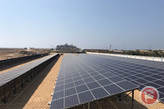
The European Union declared completing the biggest photovoltaic solar field in the besieged Gaza Strip providing 0.5 Megawatts of electricity per day to fuel the Southern Gaza Desalination Plant.
The EU said in a press release that the "EU-funded Southern Gaza Desalination Plant currently provides drinking water to 75,000 inhabitants in the Khan Younis and Rafah districts."
"With the new energy field and new investments foreseen it will eventually reach 250,000 people in Southern Gaza by 2020," the statement added.
The EU Commissioner for European Neighborhood Policy and Enlargement Negotiations Johannes Hahn said that "limited energy supplies in Gaza are one of the main challenges when improving access to safe and drinkable water to the local population."
Hahn added that "the photovoltaic solar field is essential to respond to the urgent water needs in the Gaza Strip and create dignified living conditions for its people, thus mitigating tensions in a highly conflict sensitive area."
The EU said in a press release that the "EU-funded Southern Gaza Desalination Plant currently provides drinking water to 75,000 inhabitants in the Khan Younis and Rafah districts."
"With the new energy field and new investments foreseen it will eventually reach 250,000 people in Southern Gaza by 2020," the statement added.
The EU Commissioner for European Neighborhood Policy and Enlargement Negotiations Johannes Hahn said that "limited energy supplies in Gaza are one of the main challenges when improving access to safe and drinkable water to the local population."
Hahn added that "the photovoltaic solar field is essential to respond to the urgent water needs in the Gaza Strip and create dignified living conditions for its people, thus mitigating tensions in a highly conflict sensitive area."
2 aug 2018
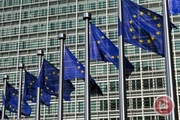
Since the decision of the Israeli occupation to shut down the Karem Abu Salem crossing, the Madina Factory for Soft Drinks tried to find an alternative plan to keep its production line going, but all its attempts did not succeed, until the factory stopped working completely.
Ahed Mahdi, the factory’s public relations director, told the PIC: “The factory closed its doors effectively five days ago.” He expressed his regret over the decision to shut down the Karem Abu Salem crossing and the occupation’s ongoing practices of preventing the entry of raw materials.
Mahdi explained that the factory’s management has reduced the daily work load since the closure of the Karem Abu Salem crossing about three weeks ago to 70%, and used its reserves of raw materials, “but the continuing closure of the crossing forced the factory to stop working altogether.”
He pointed out that about 90 workers who support their families by working at the factory had to join the ‘army of unemployed’ in Gaza, explaining that there is a clear targeting of national factories.
Targeting the national industry
“The Israeli occupation does not mind allowing basic goods and supplies from Israel and other foreign companies, in light of its refusal to allow raw materials into Gaza to be used by national factories, which confirms the targeting of our industry and national factories by the Israeli occupation,” says Mahdi.
Mahdi pointed out that the factory, founded in 2005, was subjected to semi-total destruction in 2008, and a total destruction in 2014, indicating that the occupation was placing conditions on allowing raw materials to the Gaza Strip, especially soda and other materials needed to run the factory, preventing it from functioning completely following the closure of the Karem Abu Salem crossing weeks ago.
The Madina factory runs three lines of production of soft drinks, two lines of 330 ml, a third for filling one and two liters bottles. It also has a line to fill mineral water (one liter and a half), noting that the Gaza Strip is one of the areas that consumes soft drinks, especially in the months from June to October.
He pointed out that during this time of the year, the production lines are all operational, and a line might have two shifts to cover the demand, while a line or two function throughout the year due to the lack of demand.
Factories threatened
Economic expert Mohammed Abu Jiyab warned of Gaza’s unprecedented economic collapse as the costal enclave is suffering from a shortage of basic and financial resources and a sharp drop in cash flow.
Abu Jiyab explained to the PIC that the Gaza Strip is exposed to the drying up of money available, pointing out that dozens of factories closed and pushed their workers towards ‘the armies of unemployed’, while the remaining factors are under the threat to close due to accumulated crises.
He also warned of the beginning of a shortage of some basic commodities in Gaza due to the siege on the one hand, and the inability of the owners of capital and companies to import these materials and the lack of liquidity and the low purchasing power of the citizens of Gaza which hit the lowest level.
He added: “We are heading towards a sensitive and dangerous stage, and I expect that there will be a comprehensive collapse in the Gaza Strip, if quick solutions to its crises are not reached,” pointing out that this foreshadows a major and near explosion.
Ahed Mahdi, the factory’s public relations director, told the PIC: “The factory closed its doors effectively five days ago.” He expressed his regret over the decision to shut down the Karem Abu Salem crossing and the occupation’s ongoing practices of preventing the entry of raw materials.
Mahdi explained that the factory’s management has reduced the daily work load since the closure of the Karem Abu Salem crossing about three weeks ago to 70%, and used its reserves of raw materials, “but the continuing closure of the crossing forced the factory to stop working altogether.”
He pointed out that about 90 workers who support their families by working at the factory had to join the ‘army of unemployed’ in Gaza, explaining that there is a clear targeting of national factories.
Targeting the national industry
“The Israeli occupation does not mind allowing basic goods and supplies from Israel and other foreign companies, in light of its refusal to allow raw materials into Gaza to be used by national factories, which confirms the targeting of our industry and national factories by the Israeli occupation,” says Mahdi.
Mahdi pointed out that the factory, founded in 2005, was subjected to semi-total destruction in 2008, and a total destruction in 2014, indicating that the occupation was placing conditions on allowing raw materials to the Gaza Strip, especially soda and other materials needed to run the factory, preventing it from functioning completely following the closure of the Karem Abu Salem crossing weeks ago.
The Madina factory runs three lines of production of soft drinks, two lines of 330 ml, a third for filling one and two liters bottles. It also has a line to fill mineral water (one liter and a half), noting that the Gaza Strip is one of the areas that consumes soft drinks, especially in the months from June to October.
He pointed out that during this time of the year, the production lines are all operational, and a line might have two shifts to cover the demand, while a line or two function throughout the year due to the lack of demand.
Factories threatened
Economic expert Mohammed Abu Jiyab warned of Gaza’s unprecedented economic collapse as the costal enclave is suffering from a shortage of basic and financial resources and a sharp drop in cash flow.
Abu Jiyab explained to the PIC that the Gaza Strip is exposed to the drying up of money available, pointing out that dozens of factories closed and pushed their workers towards ‘the armies of unemployed’, while the remaining factors are under the threat to close due to accumulated crises.
He also warned of the beginning of a shortage of some basic commodities in Gaza due to the siege on the one hand, and the inability of the owners of capital and companies to import these materials and the lack of liquidity and the low purchasing power of the citizens of Gaza which hit the lowest level.
He added: “We are heading towards a sensitive and dangerous stage, and I expect that there will be a comprehensive collapse in the Gaza Strip, if quick solutions to its crises are not reached,” pointing out that this foreshadows a major and near explosion.
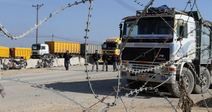
Israel decided to tighten its blockade on the Gaza Strip and said that paid shipments of fuel and gas would not be allowed in through the Karam Abu Salem (Kerem Shalom) border crossing.
A statement from Israeli war minister Avigdor Lieberman’s office on Wednesday said he had ordered a halt to fuel supplies into Gaza via the Karam Abu Salem crossing until further notice.
Lieberman’s office justified the decision by claiming it was taken in view of the continued launch of incendiary balloons and kites at Israel and the holding of weekly protests along the border fence in Gaza.
Israel had already prevented the entry of commercial goods to Gaza and slashed the fishing zone from six to three miles, citing the same reasons for its decision.
Four months of weekly Friday border protests that began on March 30 have calmed slightly, but organizers have vowed they will continue until Israel lifts its siege on Gaza.
At least 155 Palestinians have been killed and many others have suffered injuries in the border protests.
A statement from Israeli war minister Avigdor Lieberman’s office on Wednesday said he had ordered a halt to fuel supplies into Gaza via the Karam Abu Salem crossing until further notice.
Lieberman’s office justified the decision by claiming it was taken in view of the continued launch of incendiary balloons and kites at Israel and the holding of weekly protests along the border fence in Gaza.
Israel had already prevented the entry of commercial goods to Gaza and slashed the fishing zone from six to three miles, citing the same reasons for its decision.
Four months of weekly Friday border protests that began on March 30 have calmed slightly, but organizers have vowed they will continue until Israel lifts its siege on Gaza.
At least 155 Palestinians have been killed and many others have suffered injuries in the border protests.
1 aug 2018
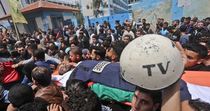
Israeli occupation forces closed off on Wednesday the Jalama crossing, north of Jenin province, without prior notices, blocking Palestinians’ access to their workplaces.
Scores of workers and vehicles lined up in the street after the Israeli military sealed off the Jalama thoroughfare.
Movement has been blocked before Palestinian passengers on both sides of the crossing.
The Jalama crossing is the sole passageway connecting Jenin to territories occupied in 1948. Thousands of Palestinian workers and merchants pass through the crossing on a daily basis.
Scores of workers and vehicles lined up in the street after the Israeli military sealed off the Jalama thoroughfare.
Movement has been blocked before Palestinian passengers on both sides of the crossing.
The Jalama crossing is the sole passageway connecting Jenin to territories occupied in 1948. Thousands of Palestinian workers and merchants pass through the crossing on a daily basis.
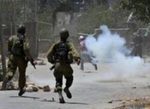
Medical sources have reported, on Tuesday evening, that Israeli soldiers injured several Palestinians after the army invaded Sebastia town, north of Nablus, in northern West Bank.
Mohammad Azem, the mayor of Sebastia, told the WAFA Palestinian News & Info Agency, that the several army jeeps invaded the town, and attacked many Palestinians, who protested the incursion.
He added that several Palestinians suffered the effects of teargas inhalation, and received the needed treatment by local medics.
The soldiers also forced store owners in the archeological area to close, and to leave.
Mohammad Azem, the mayor of Sebastia, told the WAFA Palestinian News & Info Agency, that the several army jeeps invaded the town, and attacked many Palestinians, who protested the incursion.
He added that several Palestinians suffered the effects of teargas inhalation, and received the needed treatment by local medics.
The soldiers also forced store owners in the archeological area to close, and to leave.
31 july 2018
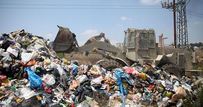
The Palestinian Authority (PA) customs police on Monday evening stopped an Israeli truck laden with plastic waste as it was trying to enter Jenin in the West Bank to dump its load.
The customs police said the truck had an Israeli registration plate and was carrying 19 huge boxes containing unsafe plastic waste from Israel (the 1948 occupied lands).
In accordance with Basel Convention and the law of the Environmental Quality Authority, the police said that the competent authorities decided to send the truck and its load back to its source in Israel.
The West Bank has become a dumping site for hazardous waste, which is either smuggled from Israel or dumped by illegal settlements in the occupied Palestinian territories.
The PA accuses the Israeli authorities of using the West Bank as a cheap and easy alternative for dumping their waste at the expense of the health of Palestinians.
The customs police said the truck had an Israeli registration plate and was carrying 19 huge boxes containing unsafe plastic waste from Israel (the 1948 occupied lands).
In accordance with Basel Convention and the law of the Environmental Quality Authority, the police said that the competent authorities decided to send the truck and its load back to its source in Israel.
The West Bank has become a dumping site for hazardous waste, which is either smuggled from Israel or dumped by illegal settlements in the occupied Palestinian territories.
The PA accuses the Israeli authorities of using the West Bank as a cheap and easy alternative for dumping their waste at the expense of the health of Palestinians.
30 july 2018
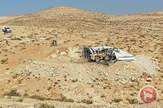
Israeli forces demolished a steel structure used for housing sheep on Monday east of Yatta City in the southern West bank district of Hebron.
Locals said that an Israeli bulldozers escorted by soldiers demolished the structure, in the Tuba area east of Yatta, under the pretext of being built without the nearly impossible-to-obtain Israeli building permit.
Sources added that the demolished structure belonged to Ismail Elayyan and that he had not received a prior notice regarding the demolition.
The demolished structure provides economic lifelines to many Palestinian families; the damages have yet to be counted.
In Area C, the more than 60 percent of the West Bank under full Israeli security and civilian control, Palestinian construction and land management is prohibited unless through consent or authorization by the Israeli Civil Administration.
Nearly all Palestinian applications for building permits in Area C are denied by the Israeli authorities, forcing communities to build illegally.
Locals said that an Israeli bulldozers escorted by soldiers demolished the structure, in the Tuba area east of Yatta, under the pretext of being built without the nearly impossible-to-obtain Israeli building permit.
Sources added that the demolished structure belonged to Ismail Elayyan and that he had not received a prior notice regarding the demolition.
The demolished structure provides economic lifelines to many Palestinian families; the damages have yet to be counted.
In Area C, the more than 60 percent of the West Bank under full Israeli security and civilian control, Palestinian construction and land management is prohibited unless through consent or authorization by the Israeli Civil Administration.
Nearly all Palestinian applications for building permits in Area C are denied by the Israeli authorities, forcing communities to build illegally.

Canada announced Sunday it will provide CAN$50 million ($38.2 million) for humanitarian aid in Palestine.
In a written statement, Canadian Development Minister Marie-Claude Bibeau said: "Canada is committed to addressing the needs of the poorest and most vulnerable Palestinians."
The statement came during Bibeau’s visit to Israel and the Israeli-occupied West Bank from July 25 to 29, 2018.
Bibeau said: "The fresh support for Palestinians focuses on urgent humanitarian needs and on economic growth"
A total of CAN$12.65 million ($9.7 million) will be allocated to the projects for food security, health, protection, and economic needs, as well as supporting survivors of gender-based violence.
Also, CAN$37.7 million ($28.9 million) will be allocated to projects that will increase economic opportunities for Palestinians, particularly women and youth, by supporting their economic empowerment, entrepreneurship and employment.
In a written statement, Canadian Development Minister Marie-Claude Bibeau said: "Canada is committed to addressing the needs of the poorest and most vulnerable Palestinians."
The statement came during Bibeau’s visit to Israel and the Israeli-occupied West Bank from July 25 to 29, 2018.
Bibeau said: "The fresh support for Palestinians focuses on urgent humanitarian needs and on economic growth"
A total of CAN$12.65 million ($9.7 million) will be allocated to the projects for food security, health, protection, and economic needs, as well as supporting survivors of gender-based violence.
Also, CAN$37.7 million ($28.9 million) will be allocated to projects that will increase economic opportunities for Palestinians, particularly women and youth, by supporting their economic empowerment, entrepreneurship and employment.
29 july 2018
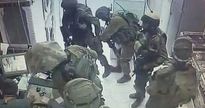
Israeli army troops stormed on Sunday a Palestinian market in the southern occupied West Bank province of al-Khalil and kidnapped a young man.
A PIC news correspondent said Israeli soldiers broke into the Dweik market in Bab al-Zawiya and ravaged a clothes shop owned by al-Harroub family.
A state of panic overwhelmed children and women who were at the market.
The assault culminated in the abduction of 32-year-old Hasan Khalil al-Harroub. The latter was dragged to unknown location by the occupation soldiers.
A PIC news correspondent said Israeli soldiers broke into the Dweik market in Bab al-Zawiya and ravaged a clothes shop owned by al-Harroub family.
A state of panic overwhelmed children and women who were at the market.
The assault culminated in the abduction of 32-year-old Hasan Khalil al-Harroub. The latter was dragged to unknown location by the occupation soldiers.
28 july 2018

Head of the Popular Committee Against the Siege Jamal al-Khudari on Saturday said that the number of trucks prevented from entering the Gaza Strip via Karam Abu Salem crossing, which has been closed for 19 consecutive days, increased to 3,000.
Al-Khudari said that the trucks carry more than 1,000 items of much needed goods including raw materials needed for industry, building materials, clothes, textiles, wood, household items, stationery and other essentials.
In a press statement Saturday, al-Khudari explained that this ban will adversely affect the Palestinian economy, which is already deteriorating due to the 12-year-long blockade, and cause direct and indirect losses estimated at millions of dollars.
He pointed out that these trucks, which carry much-needed goods worth over $60 million, are subject to multiple risks because of the Israeli ban.
He warned of a possible rapid collapse of the industrial and commercial sectors and all related services.
Al-Khudari said that the trucks carry more than 1,000 items of much needed goods including raw materials needed for industry, building materials, clothes, textiles, wood, household items, stationery and other essentials.
In a press statement Saturday, al-Khudari explained that this ban will adversely affect the Palestinian economy, which is already deteriorating due to the 12-year-long blockade, and cause direct and indirect losses estimated at millions of dollars.
He pointed out that these trucks, which carry much-needed goods worth over $60 million, are subject to multiple risks because of the Israeli ban.
He warned of a possible rapid collapse of the industrial and commercial sectors and all related services.
27 july 2018

Israeli settlers on Friday afternoon carried out several aggressions on Palestinian property near Jaloud town, southeast of Nablus city in the northern West Bank.
Anti-settlement activist Ghassan Daghlas said that a group of Israeli settlers from Esh Kodesh settlement, built by force on Palestinian lands, attacked a number of houses near Jaloud town. One house was burned and another was vandalized.
The settlers further burned over 50 trees and set nearby farmlands alight, according to Daghlas.
He explained that the targeted houses are owned by Palestinian citizens from neighboring villages and no-one was inside during the attack.
The Palestinian activist added that the settlers deliberately carried out the attack during Friday prayer. Palestinian citizens following the prayer rushed to the area to defend their property and clashed with the settlers.
The Israeli occupation forces later arrived in the scene, provided protection to the settlers, and detained a number of Palestinian citizens.
Anti-settlement activist Ghassan Daghlas said that a group of Israeli settlers from Esh Kodesh settlement, built by force on Palestinian lands, attacked a number of houses near Jaloud town. One house was burned and another was vandalized.
The settlers further burned over 50 trees and set nearby farmlands alight, according to Daghlas.
He explained that the targeted houses are owned by Palestinian citizens from neighboring villages and no-one was inside during the attack.
The Palestinian activist added that the settlers deliberately carried out the attack during Friday prayer. Palestinian citizens following the prayer rushed to the area to defend their property and clashed with the settlers.
The Israeli occupation forces later arrived in the scene, provided protection to the settlers, and detained a number of Palestinian citizens.
Page: 23 - 22 - 21 - 20 - 19 - 18 - 17 - 16 - 15 - 14 - 13 - 12 - 11 - 10 - 9 - 8 - 7 - 6 - 5 - 4 - 3
